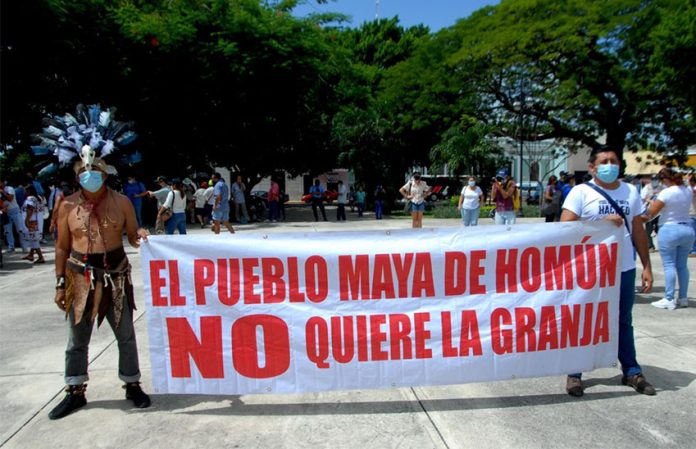Some 500 residents from the Mayan town of Homún, Yucatán, traveled to protest in the state capital Mérida Tuesday, fearing that a 49,000-head hog farm in the town’s vicinity would be reopened. A court decision on the matter is due Thursday.
Producción Alimentaria Porcícola (Papo) was built in a Natural Protected Area that attracts tourists for its “ring of cenotes.” Residents have expressed concern that water in the area could become contaminated by pig urine and excrement; a potential disaster for 80% of the population which depends economically on tourism.
The farm has not been in operation since 2018 due to a Yucatán court verdict. That decision was unanimously upheld by the Supreme Court in May, meaning Papo has been forced to remain closed pending tomorrow’s decision in the state’s Second District Court.
However, residents of Homún have alleged that the state government, led by Governor Mauricio Vila Dosal, was attempting to wield influence on the court in favor of reopening the farm.
On June 6, Papo filed a document before the judge which had been issued by the state Ministry of Sustainable Development. In the text the ministry’s legal director, Karen Aguirre Bates, stated that farm was “sufficiently equipped to achieve compliance with the maximum permitted limits of pollution.”
Earthjustice, a nonprofit environmental law organization, filed a friend of the court brief prior to the Supreme Court’s decision in May, which detailed “substantial scientific evidence about the grave and irreversible harm to human health and the environment associated with industrial hog operations … contamination of water, including naturally occurring freshwater wells known as cenotes; emission of noxious air pollution; the spread of dangerous pathogens and contribution to climate change.”
Resident Martina Ramirez Soberanis called on the state government to stand in opposition to the farm. “We believe it is time for the state government of Yucatán … to take a stand against the abuses of the mega pig factory … [which is] trampling on the rights of the Mayans of Homún,” she said.
Another protester complained that the voice of local people was being ignored. “These people from the companies do not love Homún, they just want the farm. We did our consultation and the people of Homún said ‘no, and no,’ and we continue to say ‘no,’ and we will keep defending the water for the future of the children … we are going to continue in the struggle … we remain united and we will defend the sacred water.”
It has been estimated that Papo would generate over 272 million kilograms of urine and feces each year, more than is generated by the entire human population of Tijuana.
With reports from Milenio
